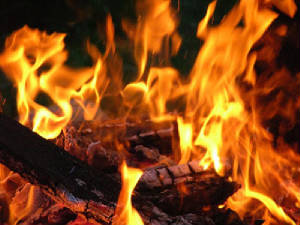
|
Welcome to Guiding With Guider Dusk |
|
|
Creating Campfire Magic |
|
|
Did you ever watch a campfire? When the wood had fallen low? And the ashes start to whiten Round the embers’ crimson glow? With the night sounds all around you Making silence doubly sweet, And a full moon high about you That the spell may be complete? Tell me, were you ever nearer To the land of heart’s desire Than when you sat there a-thinking With your feet before the fire? - B. Riddoch We have
all been touched at one time or another by a perfect campfire, the theme appropriate, the choice of songs perfect, the singers
enthusiastic – you know the good feelings, mood and memories created will linger with the participants long after the
embers have died. Indeed this campfire may be one the participants remember well into their adult years. This is
campfire magic and magic doesn’t happen by accident or luck. Such a campfire has been well-planned. With skill, practice,
thought and preparation, magical campfires can become the rule rather than the exception. Campfire
singing, whether inside or at a make believe campfire or outdoors with the warmth and glow of a real campfire can be an experience
of a lifetime. But in order to have a happily anticipated and memorable campfire, this event, like all other items making
up a program for a meeting or camp weekend must be planned. This planning
involves thoughtful selection of songs and a prepared sequence with organized leadership. To
improve the quality and maintain a high level of interest in campfire time, there are a number of general principles, which
can be helpful. 1. In a well-organized group, the
campfire can be planned and carried out by the participants themselves, with minimal direction from the Leader in Charge.
In a newer group, it may be necessary for the Leader in Charge to take a more active part in the organizing and running of
a campfire until the group members get the general idea of the campfire as part of their weekly meeting. Encourage the group
members themselves to plan and carry out as much of the campfire program as they are capable of doing. 2. When the entire responsibility
for the campfire is in the hands of the group members, be sure that there is one person who is in charge of the overall program
“The Campfire Leader.” Then direct all inquiries to them. 3. Although planning is necessary,
try to avoid a “program” atmosphere. Keep the campfire as informal as possible. Try to keep an atmosphere of spontaneity. 4. Don’t try to include too
much in the campfire. If the planned items take longer than anticipated, save some of them for the next campfire. Generally,
a skit, short campfire game or other item and a concluding reading or meditation, with songs suitably interspersed, will be
enough. With an outdoor campfire, plan you program with extra songs to ensure the campfire lasts as long as the flame. 5. Keep the campfire short. As a
general rule, the campfires held at the close of a regular meeting, should not be shorter than fifteen minutes and no longer
than thirty. 6. Base the campfire program around
a central theme. Select songs, poetry, readings or skits to add to the groups’ interest in and knowledge of, the particular
theme. Occasionally, however, a campfire will be more enjoyable if there is no special theme, the group being allowed to present
any ideas desired. 7. Maintain interest by variety.
Alternate action songs and quieter songs. Make use of quick quizzes, charades and occasional inter-patrol competition, poetry
and prose readings as well as humorous songs and stories. 8. At certain times, it may be suitable
to have the complete campfire follow a quieter theme. Then strike a contemplative mood with a religious reading or story which
is inspirational or offers food for thought, a reading or concluding spiritual hymn encourage the group to reflect on the
more serious aspects. 9. Don’t be afraid to do something
different. The scope of items, which may profitably be included in campfire, is almost limitless. 10. Keep the program moving. Don’t continue one item
until everyone is bored. Cut it off when interest is high. Then a similar item will be well received another time. 11. Try to end the campfire on a quiet note. This may be
accomplished by the use of a reflective poem, a brief meditation on one of the laws or singing of a quiet song or hymn. 12. In teaching a new song, don’t aim for perfection
the first time it is sung. As long as the words and general idea of the tune are learned, wait for a second or third occasion
to iron out the details. Keep a notebook of campfire ideas, which are
particularly successful. Make the entry as soon as possible after seeing the item to avoid forgetting the important details. How To Start At first, concentrate on well-known favourites. Make
sure the group members learn these thoroughly and correctly. Then introduce rounds to enlarge their repertoire and introduce
harmony and part-singing. If it is simple, then it can be learned and even given a degree of expression all at one campfire.
If it is a more difficult piece, tackle the melody one week, have the group learn the words. Fit the words in at the second
go and perhaps add a descant or alto. Each group should have a set of songbooks that can
be used by the group and Leaders in planning their campfires. Another helpful tool
is for group to make their own songbook, a collection of favourites new and old, games, skits, stories, fun silly songs, vespers,
etc. Keeping a log of what worked and didn’t is a good planning tool as well. DO NOT let the group bury their noses in any book during campfire. Include folk songs and a variety of action songs
to help supply the very important element of fun.
Avoid Songs in Bad Taste · Those with
cheap vulgar words, the ghoulish songs. · The parodies
when the tune is strongly associated with a completely different set of words from those being used. · Songs where
the words contain cheap humour or have an unattractive story. · Avoid songs
with poor poetic content, with sentimental jargon as words. A Campfire is a dramatic presentation.
Physical Arrangements ·
Compact circle so that all can see, hear and be included · Comfort important – cold floors – sit-upon rather than chairs; ventilation · Atmosphere – simulated fires inside; lights out Planning ·
Use a campfire planning group ·
Importance of a written plan and checking it beforehand Carrying out the Plan ·
The Campfire Leader(s) ·
Control of the group – starting and stopping ·
Pace ·
No interruptions – announcements, eating The Program ·
Mood and theme ·
Opening – traditional fire opening, readings ·
Closing – traditional prayer, reading, vesper, taps ·
A vesper is praise and thanks to your creator, not just a quiet song ·
Assess the needs of the group and consider: variety, fun, participation, non-musical items, (skits, games,
stories, entertainment patrol, etc.) ·
Possible ingredients: rounds, part songs, fire songs, fun, action, rhythm, quiet, folk, rousers, etc. Framework – Campfire shape… ·
Official Opening ·
Well Known Songs ·
Round & Part Songs ·
Fun Songs ·
Action Songs ·
Games ·
Rousing Songs ·
Quieter Songs ·
Story ·
Spiritual Songs ·
Vesper & Taps ·
Official Closing Remember to “follow the flames" · When the flames are high, action songs, loud cheers,
and noisy stunts get everyone involved! · When the flames bum down, have quiet songs, inspirational
stories, and a respectful tone · Start FAST, reach a PEAK, slow DOWN, and give an inspiring
CLOSE Formal Campfire ·
Camp opening and closing ·
Fire candlelight procession to light special event Informal Sing-A-Long ·
Regular meeting – routine format one or two oldies plus learn new ones ·
Special visitors (i.e. mothers, seniors, etc.) ·
Special themes or activity (i.e. holidays, puppets, instruments, talent nights, etc.) ·
Irregular meetings ·
Special speakers ·
Just chit-chat ·
Special discussion ·
Patrol games ·
All skits – fun and test work ·
Taking campfire out to someone or somewhere Planned By ·
Campfire Planning Group duty rotation ·
Group Leaders ·
Appointee Conducted By ·
Group Leader, after given program to follow ·
Campfire Leader ·
Volunteer from group ·
Several persons Time for Campfire ·
End of meeting · Beginning of meeting (i.e. cook-out lunch/supper meeting
followed by hike, star gazing, sing while meal is cooking) ·
Camping weekend ·
Special event The Fire · Choose a special
place, away from the campsite, this means the participants will have to ‘go’ to Campfire · Traditional
campfire formation is a circle with the fire in the center as a focal point. · Leave a gap
in the circle downwind for smoke and sparks. · Never leave
a burning fire unattended. Indoor Campfires ·
Be creative with the focal point. Use your imagination ·
‘Pretend”
fire ·
Incense ·
Coloured logs ·
Specially built and
lighted fires ·
Candles |
||||||||||
|
||||||||||

